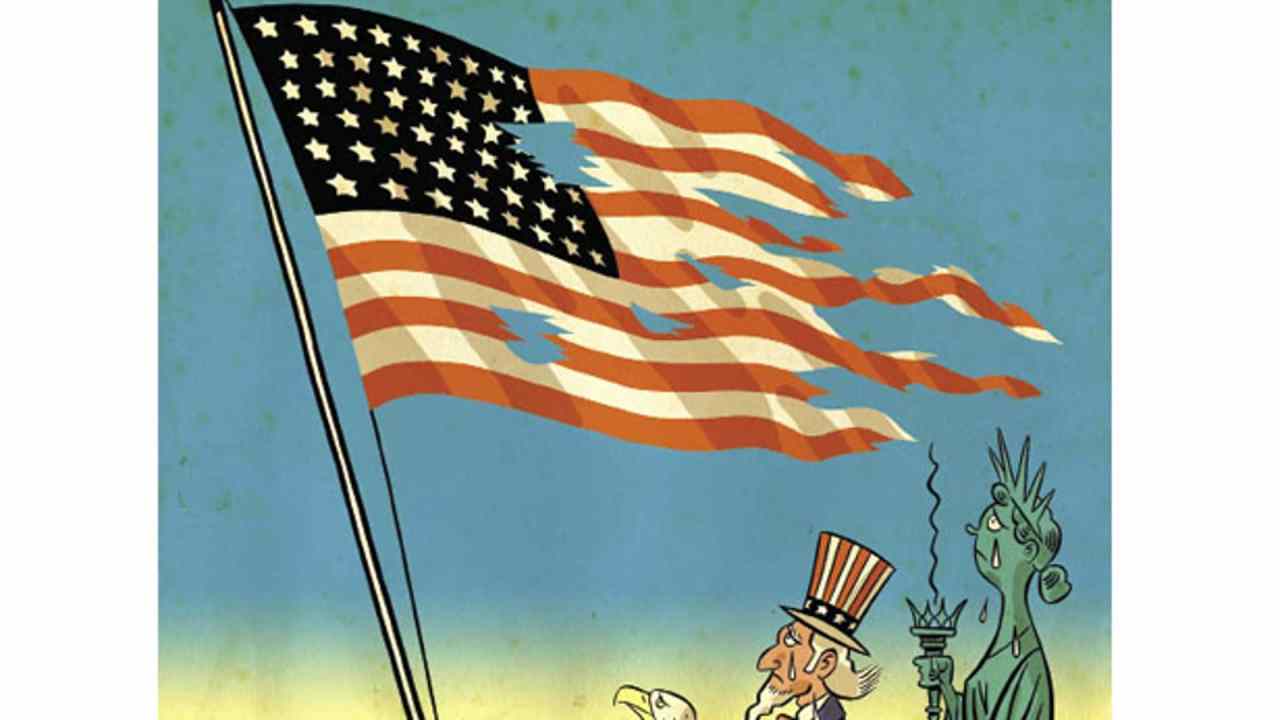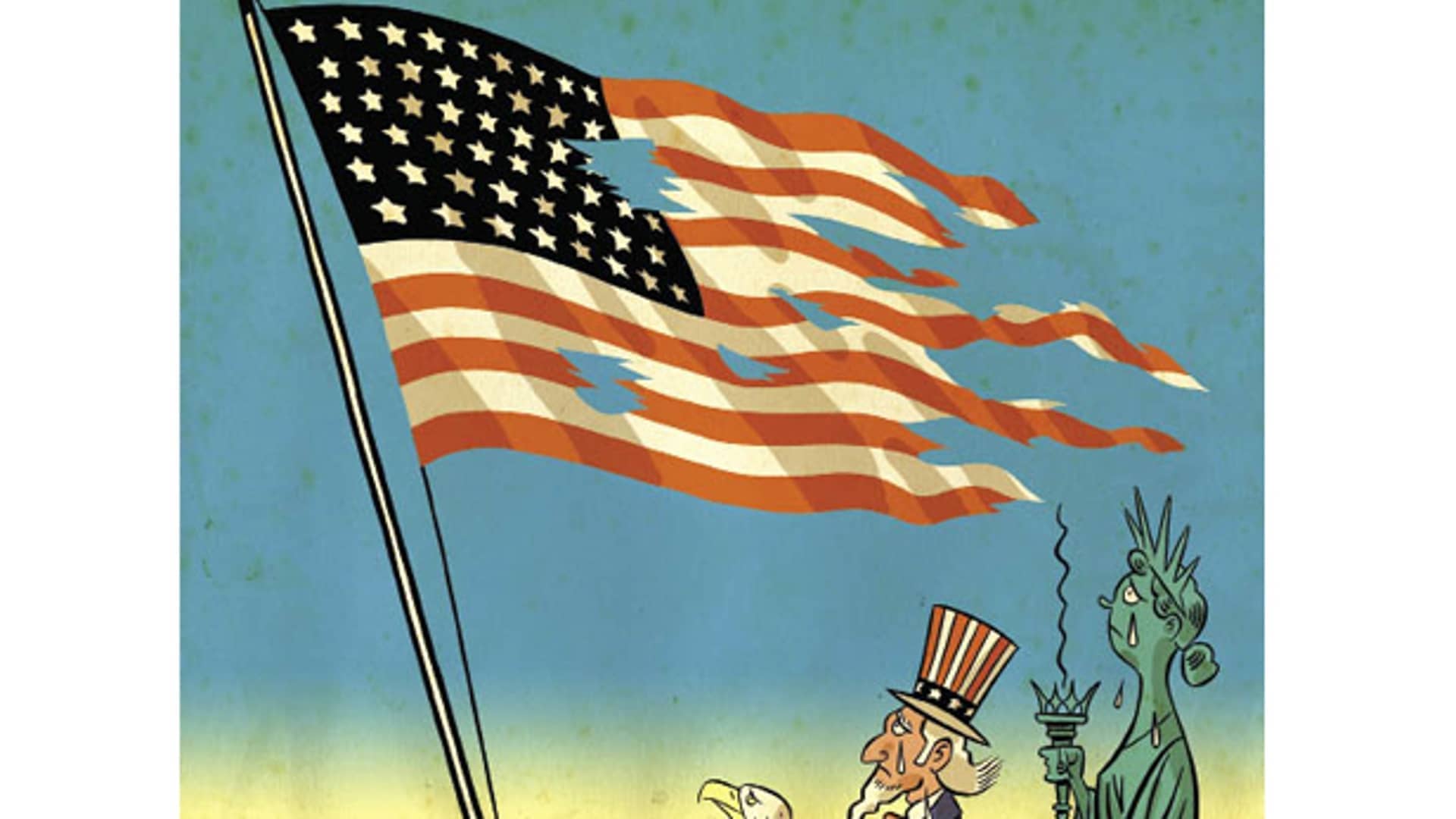Here’s a fun fact: almost half of Americans believe that there will be a civil war in their lifetimes. Less fun fact: they could be right. To observe the United States today is to watch a country that cannot get on with itself. Some people say that it has always been like this – that there was never any chance of a country as wide and big as America being able to agree on things. These people then point to the genius of the federalist system, and the way in which different states could have different arrangements within the union.
But as you may have heard, there have been occasions in America’s history when states were forced to do things they didn’t want to do. Two centuries ago a civil war was fought over the issue. And in the last century the issue of state law vs federal law has had a number of combustible flashpoints.
In 1965 the Supreme Court ruled (in Griswold vs Connecticut) that contraceptives should be available to married people throughout the United States. In 1967 (Loving v. Virginia) the Supreme Court swept away those remaining state laws banning interracial marriage. In 2003 the court ruled (Lawrence v. Texas) that remaining so-called ‘sodomy laws’ were unconstitutional. In 2015 (in Obergefell v. Hodges) it ruled that the right to marriage applied to gay Americans. And, most famously, in 1973 (Roe v. Wade) the Supreme Court ruled that the Constitution of the United States protected a woman’s right to have an abortion.
The existing fight looks big enough. But a bigger fight may now be on
Two lines of opposition have emerged to this. The first is those in American jurisprudence who believe that in cases such as Roe v. Wade the Supreme Court overreached itself and it had no right to make abortion a federal issue. This is a legally purist argument. But it also tends to be made by a second lot: people who oppose a woman’s right to choose, and other social issues on which the Supreme Court has ruled.
The existing fight looks big enough. But a bigger fight may now be on. Last week, in his separate opinion on the overturning of Roe v. Wade, Justice Clarence Thomas said that the overturning may mean that ‘in future cases, we should reconsider all of this Court’s substantive due process precedents, including Griswold, Lawrence and Obergefell’. In other words, after abortion the court should consider returning to the issues of contraception, anal sex and gay marriage. In the narrow legalistic sense, Thomas may be right. Judgments that have been based on a precedent that has just been overturned would now appear to be standing on legal thin air. But it did not take long for observers to notice that of course Justice Thomas (who is black, and married to a white woman) did not see fit to mention that the Supreme Court might also return to the question of Loving v. Virginia – a point which has been made with varying degrees of ugly liberal racism.
Yet whatever the legal wranglings, here, now, is where a non-legalistic morass begins. For it may be the case that in Roe v. Wade the Supreme Court overreached itself. It may also be the case that half a century later, the Supreme Court has now set the nation on a path that will be politically and socially disastrous. As the abortion issue returns to be fought over in each state, there is everywhere a radicalism in the air – a manifestation of something we have seen emerging for years in American political life: the desire not just to beat your opponents, but to hurt them.
In the immediate aftermath of the judgment, pro-abortion activists took to the streets to literally howl with rage. Many refused to concede what a majority of the public thinks, which is that third-trimester abortions should not be legal. Fighting afresh for the right to any abortions at all, many of these campaigners find themselves pushed into a demonic corner: where, in the name of protecting some abortions, they cannot oppose any abortions. Others noisily, and disastrously, celebrate them.
The anti-abortion side is no better. Having been kicked about for years by liberal activists, here was the chance for conservatives to kick back in turn. ‘We are not done,’ wrote one conservative campaigner. ‘We are not satisfied. A federal ban on abortion nationwide is the next step.’ Which if it were even attempted would of course lead to precisely the same judgement as last week’s, if the court was consistent. For the federal ruling was what got America here in the first place. But who cares about such details as the law when there are liberal tears to rejoice in?
Perhaps this is the conservative backlash – the response to decades of the left rubbing the right’s nose in it. Perhaps it is inevitable that liberal overreach would be responded to by conservative overreach. Either way, the US is now moving into an uncertain and deeply destabilising era. At a time when the country needs to solve new problems both within and without, it has been invited instead to relitigate liberal rights which had been thought settled for half a century.
What makes it worse is that the institutions that used to unite the country now bitterly divide it. I have written here before about the strange way in which the American right has fallen out of love with the legislature, the intelligence services, even the top ranks of the military. But the American left has also joined this game. The Supreme Court is now their enemy. ‘To hell with the Supreme Court. We will defy them,’ the Democrat Congresswoman Maxine Waters told a rally last week.
It seems to me that you can have different opinions and still have a country. You can probably have some variation in state laws and still have a country. But if you effectively have different political institutions, then you no longer have a country – you have two political sides which both hope that whatever punches they land will knock out their opponents for good. It is an illusion that should have been dealt its own lethal blow last week, but has instead been injected with a whole new fusillade of energy.








Comments